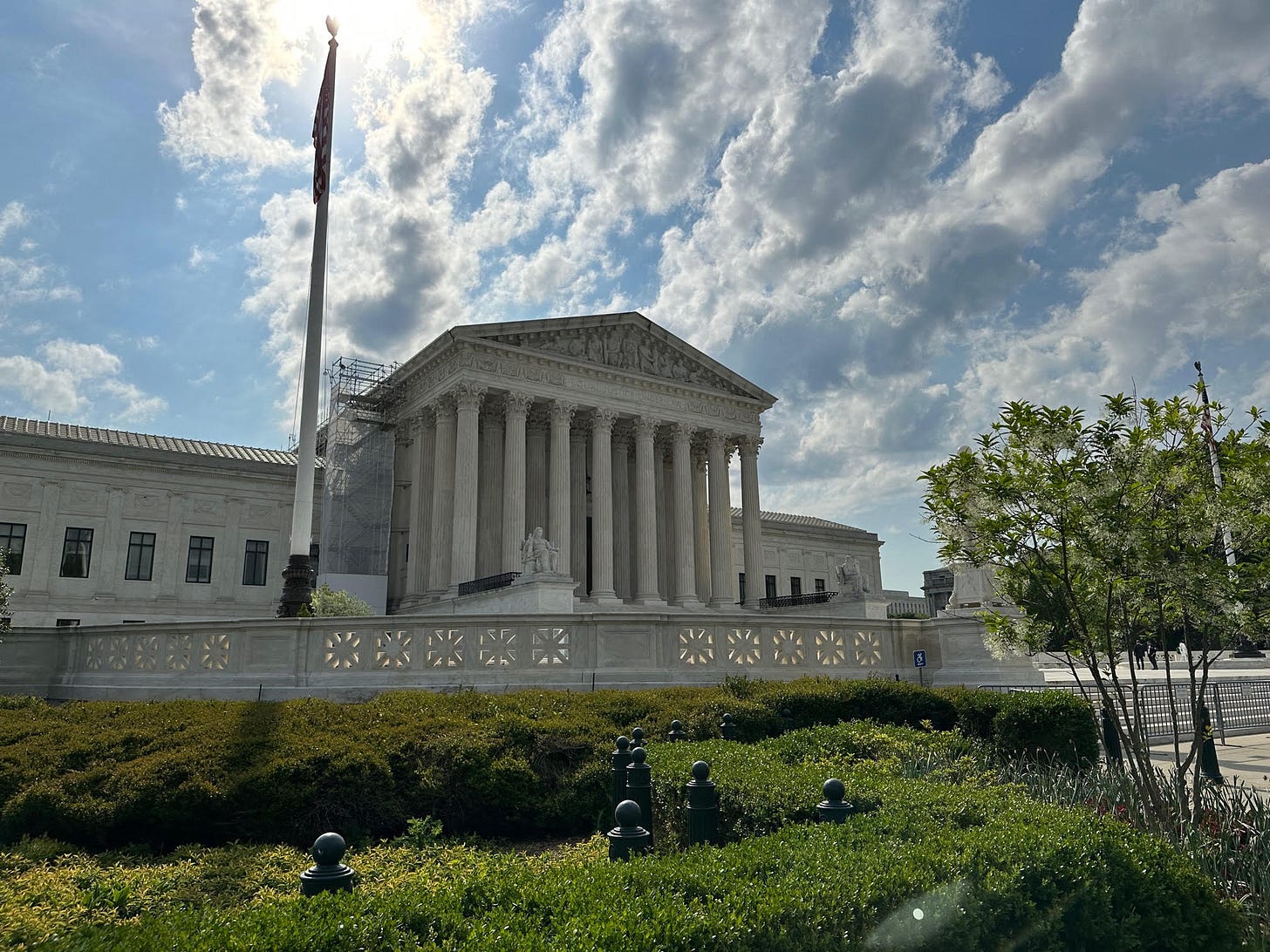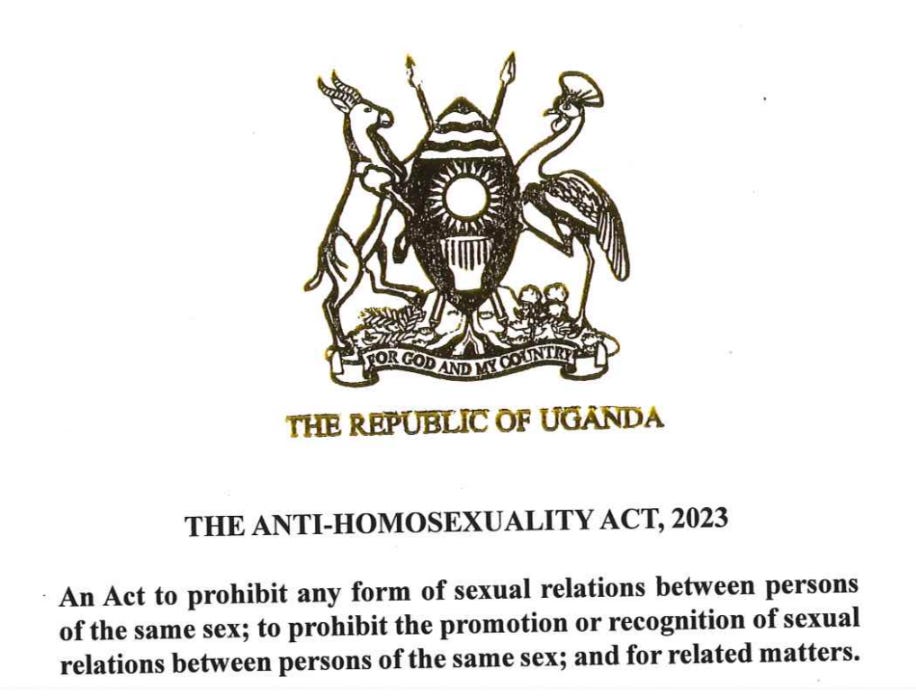Clarence Thomas's vote matters, as thirty cases and ethical questions remain
Also: Two executions are scheduled to take place in the U.S. in June. And: A lawsuit was filed Tuesday against Uganda's new Anti-Homosexuality Act, which itself has the death penalty as a punishment.
We’re heading into June.
Thirty cases that the U.S. Supreme Court heard this term remain undecided.
Justice Clarence Thomas is casting a vote in those cases — sometimes, as with last week’s decision weakening the Clean Water Act, a decisive vote — even as ethical questions about his behavior at the court (yes, at the court) and around the globe remain unanswered. These decisions are going to be coming down while Harlan Crow — Thomas’s benefactor, sorry, close, personal friend — is invoking the court as his basis for refusing to comply with congressional requests for information about those ethical questions.
The cases are significant and will change America. They include the two cases over race-conscious admissions policies — which Chief Justice John Roberts will almost certainly end with support from a majority of the court, including Thomas. There is the Voting Rights Act case, in which the justices likely will hobble what remains of the landmark law, and the case raising the “independent state legislature” scheme, which the court might toss (but could still end up deciding).
There are the two cases over the Biden administration’s student loan forgiveness program. There are religion cases — over whether anti-discrimination laws will be weakened by First Amendment speech claims by religious adherents and what accommodations must be considered for religious adherents under Title VII of the Civil Rights Act of 1964. There are cases over the Indian Child Welfare Act and the National Labor Relations Act and several criminal law cases remaining.
The next decisions are expected Thursday morning. As always, we don’t even know how many decisions are coming down, let alone which decisions they will be.
Upcoming scheduled executions
Two executions are currently scheduled to take place in the U.S. in June, one in Missouri on June 6 and the other in Florida on June. 15.
Eleven executions have taken place in four states across the nation thus far this year — including Florida, which has already carried out three executions, and Missouri, with two. The other two states to have carried out executions in 2023 are Texas, which has executed five people, and Oklahoma, which has completed one execution.
Next week, Missouri is scheduled to execute Michael Tisius. He currently has a request pending at the U.S. Supreme Court, before Justice Brett Kavanaugh, for a stay of execution in connection with a dispute over “certain medical testing” and related transportation ordered ordered by a district court as “reasonably necessary” for Tisius’s clemency case.
Duane Owen’s scheduled execution in Florida was briefly stayed by Republican Gov. Ron DeSantis to allow for a competency investigation by state-selected psychiatrists. DeSantis quickly lifted that stay of execution when the psychiatrists concluded, per DeSantis, that Owen “has the mental capacity to understand the nature of the death penalty and the reasons why it is to be imposed upon him.”
In Alabama, meanwhile, an execution that initially could have been scheduled as soon as June 3 is now scheduled for July 20, per an order from Gov. Kay Ivey. James Barber’s newly scheduled execution follows the conclusion of what Ivey claimed would be a “top-to-bottom review” of the state’s execution process, an order that followed several botched or failed executions in the state in 2022.
Uganda’s new “Anti-Homosexuality Law” is challenged in court
On Tuesday, a group of law professors and advocates challenged Uganda’s new Anti-Homosexuality Act in court, just days after President Yoweri Museveni signed the extreme bill into law.
The law punishes the “offense” of “homosexuality” — which it essentially defines as any same-sex sexual activity — with life in prison. For a “serial offender” of “homosexuality,” the punishment can be death.
A child convicted of “homosexuality” can face up to three years in prison.
The law also punishes allowing the use of any place “for purposes of homosexuality,” marrying same-sex couples, and “promotion of homosexuality.” The potential punishments for those also include up to a decade in prison.
The lawsuit alleges that the new law was passed in violation of procedural requirements and that the “homosexuality” offenses violate many provisions of the Uganda Constitution, including the rights to equality, non-discrimination, dignity, liberty, privacy, and healthy. The punishment for children, the lawsuit alleges, violates “the rights of the child” as well. The “premises” provision, the lawsuit alleges, violates the “right to property and privacy of property” and other provisions. The “promotion” provision, the lawsuit alleges, “is vague, ambiguous, and overly broad.”
The lawsuit is seeking a declaration that the provisions are unconstitutional for those and other reasons and a “permanent injunction restraining” the government from implementing the law.







I’m covering the litigation related to Owen’s execution in Florida on Tracking Florida’s Death Penalty. After Governor DeSantis lifted the temporary stay, litigation proceeded in state court per the rule. A hearing is scheduled for tomorrow afternoon. He also has an appeal pending at the Florida Supreme Court.
https://fladeathpenalty.substack.com/